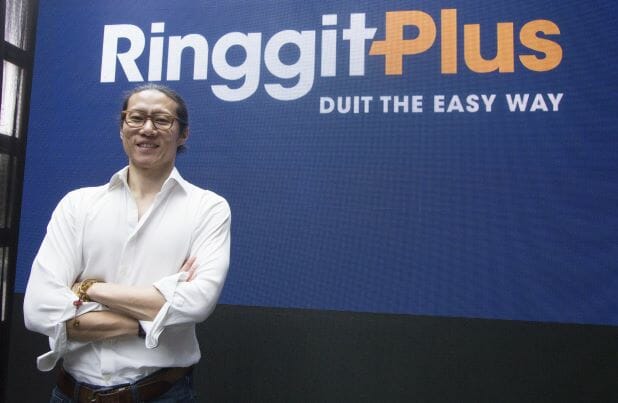Followers of financial comparison site RinggitPlus.com may have noticed that the website has been completely revamped. Not only does it now sport a brand new look and feel, it has gone live with an intuitive, Malaysian English- speaking chatbot to further personalise your visit ─ all in the name of making access to and application of financial products so much easier. Second, the brand makes it presence felt on TV when partnering with Ringgit Sense ─ TV3’s personal finance and money management programme of the past 15 years ─ and the new show complete with extended content and a fresh presentation, is now called Ringgit Sense+.
For sure, this must be a watershed moment for RinggitPlus’ founders. The website, which is owned and operated by fintech company Jirnexu Sdn Bhd, was started accidentally in 2012 when two financial buffs who had just returned from the UK, met up over coffee and realised they shared a passion for giving people financial advice and tools to save money. By the end of the discourse, the deal was sealed and the rest, as they say, is kismet.
But was it truly that straightforward? How has the journey to making a start-up’s presence felt in the crowded online financial services space really been? Siew Yuen Tuck, who prefers to be addressed as YT, is the co-founder and CEO of Jirnexu Sdn Bhd; he remembers that the trigger that drove him to get online to do something for the financial services industry was the dearth of such services in Malaysia. That, and a UK financial comparison website called moneysupermarket.com.
The Oxbridge alumnus is kitted out in shirt and jeans when we meet [but with a vague rocker vibe about him – maybe it’s the hair and the numerous bands of arm candy – Ed]. There are undeniable traces of the City of London in his hesitant, but measured drawl.
He recalls he had just come back to Malaysia in 2010 after spending 15 years living and working in London when to his shock, found that Malaysia was still very much in manual mode and a virtual Sahara in as far as online financial services were concerned.
Siew, a former hedge fund suit, recollects: “When I was working in London, every time I needed a personal financial product, whether it was a credit card, a savings account, or car insurance, I would just go to moneysupermarket.com to compare the products I wanted to get. The site was and still is the biggest online financial comparison business in the UK and they have been around for over 25 years.”
He assumed things would be the same back home and when he discovered they weren’t, it planted a seed for RinggitPlus’ inception.
Siew, who went into investment banking and leveraged finance and then equity hedge funds in the UK after graduating from Oxford in 2004, reveals that what really spurred him to get into the business was the blue ocean he saw, despite recognising that Malaysia wasn’t exactly clamouring to become online savvy at that juncture.
“But I always wanted to do something of my own in Malaysia. If we look at the world, Southeast Asia is still one of the world’s most exciting places for innovation,” he points out, adding that it did occur to him that Malaysians at the time were probably going to balk at going into an unknown website to go shopping, let alone apply for financial products. He admits he proceeded with much trepidation.
“There was no tried and tested formula to rely on because no one was doing it at the time; we were entering a completely unknown space so we kind of took things one step at a time and only figured out the next step after we got there.
“I spoke to a huge range of people to bounce off them and of course, there was a huge range of answers that came back. The tricky thing was, even till today, the internet start-up ecosystem all across Southeast Asia including
Malaysia, is still very young. Only now, are you seeing the first generation of founders from the first tech bubble boom, which burst a couple of times I might add, come full circle and these people have made good money and they are giving back to the eco system in various ways.”
The blank canvass that Siew was facing wasn’t the only hurdle. How do you get people to believe in you to the point they part with their cash? Funding for an unknown start-up posed another challenge. Back in the day, there were no P2P financing sites. Banks were the only way to obtain loans and if they said no, then angel investors were the remaining option.
“It was hard enough finding people who had been through what we were starting,” says Siew, “but having said that, one of my first angels was someone who had been in the digital start-up ecosystem, so he was one of the first people I reached out to and he became an investor and an advisor who started the ball rolling for a while.”
Today, of course, funding is different for Jirnexu. In May this year, the start-up announced that it had closed a total of USD17 million from two backers: USD11 million Series B round from Japan-based SBI Group, a returning investor for Jirnexu, and US-based investor SIG Asia Investments.
The funding will be used to serve more financial institutions, diversifying into digital identifications as well as eKYC (electronic Know Your Customer) and of course, hiring and growing the team. The company, to date, has grown from the initial twosome to a 150-strong operation with more likely to come for expanding departments.
Jirnexu currently has three strong products ─ RinggitPlus, a sister site called KreditGoGo.com in Indonesia and XpressApply, a proprietary platform that has turned Jirnexu from being an e-commerce start-up to a full stack finserve and fintech solution provider.
In light of all this success, Siew still has his feet planted firmly on the ground but his eyes are looking at the wider horizon. “What we are building in RinggitPlus is just a platform. But if you look at what’s happening in most markets is that the platform become a launch pad for other businesses. That, I would say, is what has driven a lot of investment interest into what we do. Look at Amazon, for example. They are not a traditional e-commerce player but because of the scale of what they can do on that platform, they are able to launch a lot of e-commerce services.”








